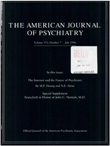Sources of individual differences in depressive symptoms: analysis of two samples of twins and their families
Abstract
OBJECTIVE: Self-reported symptoms of depression are commonly used in mental health research to assess current psychiatric state, yet wide variation in these symptoms among individuals has been found in both clinical and epidemiologic populations. The authors sought to understand, from a genetic-epidemiologic perspective, the sources of individual differences in depressive symptoms. METHODS: Self-reported symptoms of depression were assessed in two samples of twins and their spouses, parents, siblings, and offspring: one sample contained volunteer twins recruited through the American Association of Retired Persons and their relatives (N = 19,203 individuals) and the other contained twins from a population-based twin registry in Virginia and their relatives (N = 11,242 individuals). Model fitting by an iterative, diagonal, weighted least squares method was applied to the 80 different family relationships in the extended twin-family design. RESULTS: Independent analyses of the two samples revealed that the level of depressive symptoms was modestly familial, and familial resemblance could be explained solely by genetic factors and spousal resemblance. The estimated heritability of depressive symptoms was between 30% and 37%. There was no evidence that the liability to depressive symptoms was environmentally transmitted from parents to offspring or was influenced by environmental factors shared either generally among siblings or specifically between twins. With correction for unreliability of measurement, genetic factors accounted for half of the stable variance in depressive symptoms. CONCLUSIONS: Depressive symptoms in adulthood partly reflect enduring characteristics of temperament that are substantially influenced by hereditary factors but little, or not at all, by shared environmental experiences in the family of origin.
Access content
To read the fulltext, please use one of the options below to sign in or purchase access.- Personal login
- Institutional Login
- Sign in via OpenAthens
- Register for access
-
Please login/register if you wish to pair your device and check access availability.
Not a subscriber?
PsychiatryOnline subscription options offer access to the DSM-5 library, books, journals, CME, and patient resources. This all-in-one virtual library provides psychiatrists and mental health professionals with key resources for diagnosis, treatment, research, and professional development.
Need more help? PsychiatryOnline Customer Service may be reached by emailing [email protected] or by calling 800-368-5777 (in the U.S.) or 703-907-7322 (outside the U.S.).



